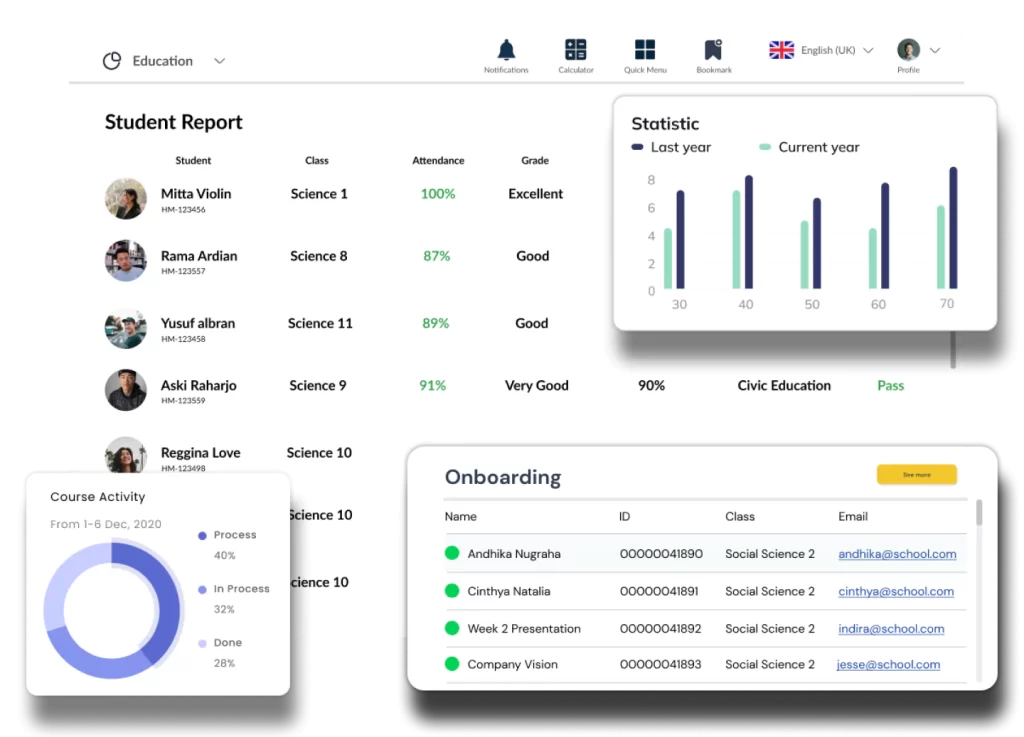Managing educational institutions’ daily operations comes with its own set of challenges, ranging from administrative tasks to data management. With the growing need for streamlined processes, adopting ERP in education has become a strategic choice for schools, colleges, and universities.
One of the best ERP solutions you can consider for your educational institution is the HashMicro School Management System, which offers automated workflows, integrated data management, and strategic decision-making support tailored to your institution’s unique needs.
Key Takeaways
|
Table of Content:
Table of Content
What is ERP for Educational Institutes?
ERP for educational institutes streamlines operations, managing administration, curriculum, attendance, student data, and fees.
In addition, it connects various departments to a central system, thus eliminating the error of redundant data, automating processes, and increasing the efficiency of the institution’s staff. It also allows information sharing across various departments and locations while establishing clear communication between management, staff, and students.
With the implementation of an ERP program education software, stakeholders can have a centralized dashboard view that lists all the relevant information. This includes, teachers can track student’s progress anytime they want, thus they will have more time to teach students.
Parents can remain informed about the progress of their child, which enhances the communication between the institution and parents. Moreover, with access to real-time data and analytics of an institute, it increases productivity, and the efficiency of planning, designing, and operating academic resources.
Also read: Main Benefits of Implementing ERP Solutions for School
Hashy AI Fact

Need to Know
Many schools have transitioned from traditional POS systems to AI solutions. With AI for the School Management System, time-consuming tasks are automated and overall communication became more efficient.
Request a free demo today!
What are The Challenges Faced by Educational Institutes?
Educational institutes are not far away from challenges, which makes these institutions look for solutions to solve their challenges, one of which is ERP implementation. The following are challenges that are often faced by educational institutes.
1. Institute and student data security
Among the prevailing threats are malware, phishing attacks, reliance on outdated technology, and a general lack of awareness regarding the vulnerability of data loss.
These issues assume even greater significance in the context of higher education, where critical research papers, patents, and valuable intellectual property make institutions particularly susceptible to cyber-attacks.
2. Parents, teachers, and students communication
Effective parent-teacher-student communication stands as a prominent challenge confronting educational institutes in contemporary times. Despite the busy schedules of today’s working parents, there exists a strong desire to actively participate in their child’s academic journey.
Nonetheless, the reality remains that most parents find it challenging to visit schools or colleges frequently for updates, rendering the establishment of consistent and convenient channels of communication an imperative task for educational institutions.
3. Productivity management
The laborious and time-consuming task of manually maintaining vast records of students and administrative activities not only proves exhausting but also hampers the performance of educators, as they find themselves increasingly immersed in administrative responsibilities. Similarly, students juggling multiple assignments can benefit from the smart writing help for students to manage their workload more efficiently.
This issue seems hard across educational institutes, potentially compromising the quality of teaching and student engagement.
4. Class scheduling
Class scheduling is another challenge faced by educational institutes. Balancing teacher availability, subject requirements, student preferences, and extracurricular activities can be complex and prone to errors.
Without an efficient scheduling system, conflicts and scheduling errors may arise, leading to disruptions in the learning process and affecting the overall academic experience.
5. Finance management
Managing finances effectively is crucial for the smooth operation of educational institutes. This includes tasks such as tuition fee collection, budgeting, payroll, and expense tracking. Manual financial management processes are often time-consuming and prone to errors.
Educational institutes require a robust system to automate and streamline their financial operations, ensuring accuracy and financial transparency.
6. Ineffective technology
Many educational institutes face challenges due to ineffective technology infrastructure. Outdated systems, software compatibility issues, and lack of integration between different systems can hamper day-to-day operations.
This leads to delays, errors, and information gaps, hindering the institute’s overall efficiency and hindering students’ learning experience. Overcoming these challenges is essential for educational institutes to provide quality education, enhance productivity, and ensure a conducive learning environment.
Implementing an effective ERP (Enterprise Resource Planning) solution tailored to the specific requirements of educational institutes can address these challenges and streamline operations.
What are The ERP Solutions for Educational Institutes?
ERP solutions offer a wide range of comprehensive features and functionalities that address the specific needs of educational institutes. These solutions are designed to streamline operations, enhance communication, and improve overall efficiency. Let’s explore some of the key ERP solutions for educational institutes:
1. Automation
Automation is one of the essential features of any ERP system. ERP is designed to automate a variety of tasks, particularly those that you perform regularly. One example of regularly recurring work that ERP could do for you is generating a report of the money your institution spent last month.
The software automatically brings specific information from all of the system’s applications. As a result, you don’t have to search for the information you need.
Even better, with good ERP systems, you can configure regular reports to present the information based on the format you want accurately. As you can see, ERP software can save you time through automation processes. Thus, it will benefit your institution’s financial bottom line as well.
2. Course Management
ERP solutions provide robust course management features that enable institutes to create, manage, and track courses effectively. This includes course planning, scheduling, curriculum management, assignment tracking, and grading. With course management software, educational institutes can ensure smooth and efficient delivery of their courses.
3. Student & Faculty Management
ERP software offers comprehensive student and faculty management capabilities. These solutions allow institutes to efficiently manage student enrollment, admissions, attendance tracking, performance monitoring, and faculty information.
The software facilitates seamless communication between students, faculty, and administrators, enhancing collaboration and engagement.
4. Tuition Fee Management
ERP solutions streamline tuition fee management by automating processes such as fee collection, billing, invoicing, and payment reminders. This simplifies financial transactions and provides real-time visibility into fee-related data. Institutes can efficiently track tuition fees and ensure transparency and accuracy in their financial operations.
5. Library Management
ERP solutions include library management software that helps educational institutes optimize their library services. The software offers features such as cataloging, circulation management, resource tracking, reservation systems, and advanced search options.
With advanced library management capabilities, institutes can provide a seamless experience to their students and faculty.
6. Task Manager
ERP solutions often come equipped with task management features that aid in tracking and managing tasks efficiently. Institutes can create assignments, monitor progress, prioritize tasks, and manage deadlines with ease. The task manager module ensures smooth coordination among administrative staff and faculty members.
7. Absence and Leave Tracker
ERP software offers absence and leave tracking functionality to manage student and faculty attendance. The software provides a centralized system to record absences, and leaves, and generate reports for analysis and decision-making purposes. This helps institutes maintain accurate attendance records and streamline attendance management processes.
8. Operational Efficiency
ERP solutions enhance operational efficiency by automating and streamlining various administrative processes. This includes data entry, document management, report generation, and system integration. By leveraging the best ERP software, educational institutes can reduce manual work, minimize errors, and improve overall productivity.
9. Advanced Technology
ERP solutions leverage advanced technologies such as cloud computing, artificial intelligence, and machine learning.
These technologies enhance the capabilities of the software, providing powerful functionalities and improving overall performance and user experience. Educational institutes can stay ahead with cutting-edge technologies and drive innovation.
10. Improve Parents-Teachers-Students Communication
ERP systems facilitate seamless communication between parents, teachers, and students. Online portals, messaging systems, notifications, and progress reports enable effective and timely communication, keeping all stakeholders informed and connected.
Improved communication strengthens the collaboration and engagement between parents, teachers, and students.
11. Institute Finance Tracking
ERP software provides robust financial tools for educational institutes, managing budgeting, expense tracking, payroll, and detailed financial reporting. With comprehensive finance tracking features, institutes can ensure transparency in their financial operations and comply with regulations.
12. Efficient Data Security
ERP solutions prioritize the security of sensitive student and institutional data. The software implements robust data security measures such as role-based access control, data encryption, regular backups, and secure authentication. These measures protect the privacy and integrity of data, ensuring that only authorized individuals have access.
How to Choose The Right ERP for Educational Institutes
When selecting an ERP (Enterprise Resource Planning) system for your educational institute, it is essential to carefully consider and evaluate various factors. By keeping these considerations in mind, you can choose the right ERP solution that best suits your institute’s needs. Here are some key factors to consider during the ERP selection process:
1. Identify specific organizational needs:
Start by assessing the specific requirements and pain points of your educational institute. Consider factors such as student enrollment, admissions, attendance tracking, finance management, and communication needs. This assessment will help you understand the functionalities and features that your ERP system should have.
2. Scalability and flexibility:
Choose an ERP solution that is scalable and flexible. Ensure that the chosen system can accommodate future growth and adapt to changing needs and technological advancements. This way, you can future-proof your institute’s operations and avoid the need for frequent system upgrades.
3. Vendor reputation and experience:
When choosing an ERP vendor for your educational institute, research their reputation and experience in the sector. Seek vendors with a proven track record in delivering ERP solutions to educational institutes. Review customer feedback, testimonials, and case studies to assess their expertise and suitability for your institute’s needs.
4. Integration capabilities:
Ensure the chosen ERP system seamlessly integrates with existing systems like learning management or student information systems. This integration streamlines data flow, preventing duplicate entry and enhancing overall efficiency.
5. Customization options:
Determine the level of customization and configuration options available in the ERP system. Look for a solution that can be tailored to align with your educational institute’s specific needs and workflows. Customization will ensure that the ERP system complements your institute’s unique processes and requirements.
6. Training and support:
Assess the training and support offered by the ERP vendor during implementation and ongoing usage. Look for vendors providing comprehensive training programs to enhance staff proficiency. Additionally, prioritize vendors offering responsive customer support to address any system-related issues promptly.
7. Total cost of ownership:
Consider the total cost of ownership when selecting an ERP solution. This includes implementation costs, licensing fees, maintenance charges, and ongoing support costs. Ensure that the chosen ERP solution fits within your institute’s budget without compromising on essential functionalities and support services.
By considering these factors and evaluating ERP solutions against these criteria, you can choose the right ERP system for your educational institute. This choice will help streamline your institute’s operations, improve efficiency, and enhance collaboration among staff, students, and parents.
Conclusion
ERP program education has several advantages in terms of technological innovation, efficiency, real-time data availability, etc. The system enables everyone involved in the academic process to connect and gain better visibility into the information they need.
HashMicro provides the best ERP software for educational institutes that is presented specifically for educational establishments to significantly improve the effectiveness of allocating and operating academic resources.
There is also a CTC Grants offer that can save you up to 70%, along with a tailored pricing scheme for this particular accounting software solution, making it a strategic and cost-efficient investment for schools and universities.
Many institutions are already taking advantage of automation, if you want to enjoy the same benefits, feel free to request a free demo of educational ERP from Hashmicro.


























































